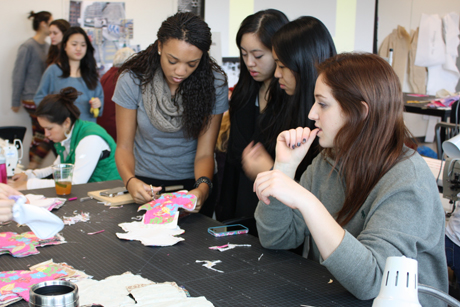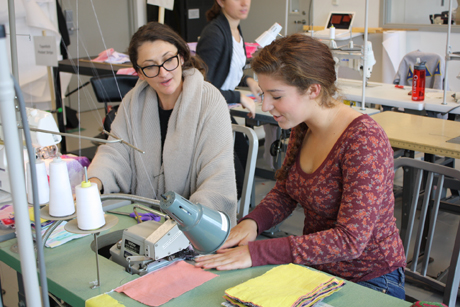Volunteers assemble hygiene kits for girls
By Sarah Cutler


For millions of girls in the developing world, getting their periods means putting their lives on hold. Without access to feminine hygiene supplies, the girls can’t leave the house to attend school, making them more likely to fall behind and drop out. And if they lack education, they’re prone to be married early and have children before their bodies are fully developed, which leads to increased odds of birth complications. This causes “a cascade of events that gets worse and worse and worse,” said Andrea Parrot, Cornell professor of policy analysis and management.
Parrot, who teaches Contemporary Issues in Women’s Health, helped lead a build day on campus Oct. 27 to produce reusable feminine hygiene kits for Days for Girls, an organization that delivers supplies to girls in more than 60 countries to allow them to go about their lives when they’re menstruating.
The volunteers – more than 150 community members and students from across Cornell – spent the day in the design studios of the Human Ecology Building marking, cutting, ironing, sewing, clipping and snapping together shields and pads for 150 kits.
The kits, which will be shipped around the world by Days for Girls, include eight washable flannel pads, two washable shields, underwear, washcloths, soap, Ziploc bags and safety pins.
“By giving girls these kits to help them manage menstruation, they can stay in school, they can learn to read,” Parrot said. “They know what other options are available, and they get married later or don’t get married at all.”
With separate stations for each task in the production process, creating the kits taught volunteers the “power of the factory” while also “contributing to a worthy cause,” said Susan Ashdown, the Helen G. Canoyer Professor in the Department of Fiber Science & Apparel Design.
The project also provided an “uncommon” volunteering experience on campus, said Elaine Jaworski ’15, one of eight student organizers for the event.
“Most volunteering on campus involves raising awareness or fundraising,” Jaworski said. “This is making a physical product, where we can donate our time and see a product come out of it. I think it’s great.”
Now in its third year, the annual event has become more efficient as its organizers have learned to enlist different organizations in the community, getting food donations from Collegetown Bagels and Ithaca Bakery and fabric donations from Quilters Corners, Homespun Boutique and Sew Green, a sustainable fabric store, according to Parrot.
“It’s a nice partnership,” said Wendy Skinner, coordinator of Sew Green, where community members attended a “sew-in” Saturday to do some of the simpler sewing for Days for Girls. “Everyone who comes to the sew-in is very inspired by the idea – they didn’t just come to sew; they really felt it. For younger women, there’s an immediacy about this.”
Sarah Cutler ’16 is a student communications assistant for the College of Human Ecology.
Media Contact
Get Cornell news delivered right to your inbox.
Subscribe